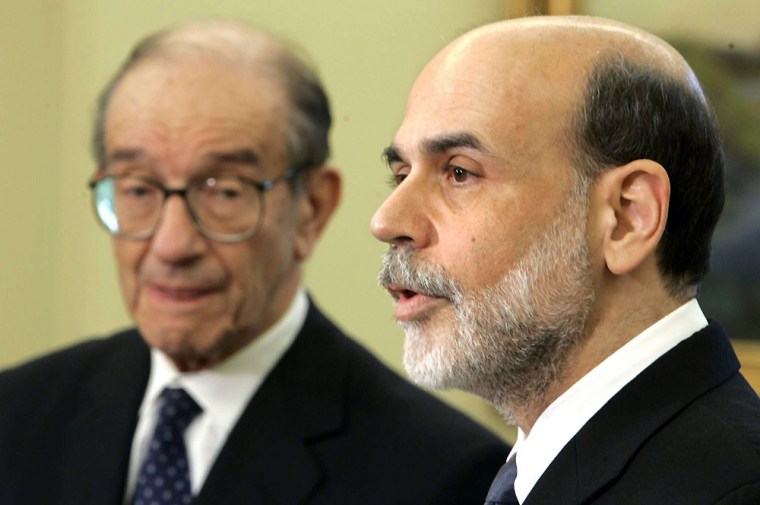With his unquestionably solid qualifications to serve as next chairman of the Federal Reserve, Ben Bernanke is likely to win easy Senate approval to take over the powerful post from Alan Greenspan early next year.
But some market analysts say they fear the former Princeton University professor might be too soft on inflation and lacks the strong stomach needed to fight structural imbalances that threaten the nation’s long-term economic health.
Bernanke’s image as an inflation “dove” stems in large part from his role as the central bank’s leading voice warning about the potential dangers of deflation when he was a Fed governor from 2002 until this year. In his landmark November 2002 speech on how to fight deflation, Bernanke said one possible tool would be a broad-based tax cut which he described as “essentially equivalent to Milton Friedman's famous ‘helicopter drop’ of money.”
That has led to an exaggerated image of a Bernanke so committed to growth at any cost that he would personally fly around dropping dollar bills from the sky if needed.
“Of course it was taken out of context,” said Axel Merk, manager of the Merk Hard Currency Fund in Palo Alto, Calif. “He was just speculating. But you get the feeling that he is very willing to do whatever it takes to get the economy into whatever shape he wants it to be in.”
Merk has been a regular critic of the chairman-designate in market commentaries over the past year, arguing that Bernanke could usher in an era of higher inflation, slower growth and a weakening dollar.
Chip Hanlon, president of Delta Global Advisors, also worries about the implications of Bernanke’s 2002 speech, which included the observation that the government “has a technology, called a printing press,” that can be used to manufacture inflation if needed.
Hanlon said Bernanke “should actively work to distance himself” from that statement.
“That high-profile statement has not been forgotten, and it suggests that when in doubt he will lean toward the side of a loose, inflationary monetary policy,” Hanlon said in a commentary. “While equities markets may welcome such a ‘stimulative’ mindset, currency markets will likely treat Bernanke with great suspicion, particularly with regard to the U.S. dollar.”
Indeed while the stock market rallied Monday on news of the nomination, the dollar fell and market interest rates rose on concern that Bernanke, currently chairman of President Bush’s Council of Economic Advisers, might be less effective than Greenspan at fighting inflation.
Mary Ann Hurley, a bond trader at D.A. Davidson & Co., predicted Bernanke will begin working to counteract those perceptions at his Senate confirmation hearing, which is likely to be held before Thanksgiving.
“Being a Fed chairman is radically different than being a Fed governor or a Council of Economic Advisers chairman or living in academia,” Hurley said. “And once he is faced with the reality of the markets hanging on every word he says and every action he does I’m not sure the label of being soft on inflation is going to stick.”
Marvin Goodfriend, a professor of economics at the Tepper School of Business at Carnegie Mellon who worked with Bernanke at the Fed, said the dovish reputation is undeserved.
“That deflation risk was not very likely, but should it have happened it would have been very costly,” Goodfriend said. “His public remarks during the period were called for, and I don’t think they say very much about whether he or anyone would be easier on inflation on the upside. ... My own feeling is he personally understands the risks of losing credibility from inflation on the upside very well.”
Goodfriend also said that Bernanke’s idea for setting an explicit inflation target -- highlighted as an area of disagreement with Greenspan -- would be merely an extension of the Fed’s growing efforts to be transparent and open about its policy goals and intentions.
“The Fed has been doing something very close to formal inflation targeting over the past 18 years or so. Making it a little more explicit would be a good thing,” he said. “In any case putting a priority on low inflation is the foundation for effective monetary policy, whatever the goals happen to be.”
Goodfriend also said Bernanke, who has rarely offered his thoughts on political issues or fiscal policy, might try to narrow his portfolio to focus more specifically on monetary policy and issues where the Fed can make a difference.
But that could be tough as he makes the transition into a position where Congress, financial markets and the public at large will seek his guidance on a wide range of economic issues.
Bernanke's first test will begin within weeks, when members of the Senate Banking Committee could grill him on anything from rising budget deficits and future tax cuts to the nation’s trade deficit and energy policy.
“I think that Bernanke will get an intense hearing before the committee, and he ought to get an intense hearing,” Sen. Paul Sarbanes of Maryland, the top Democrat on the banking panel, said Monday.
Bernanke will face “a vigorous examination on both sides of the aisle,” agreed committee Chairman Richard Shelby, R-Ala. But he saw no obstacles to Senate confirmation.
